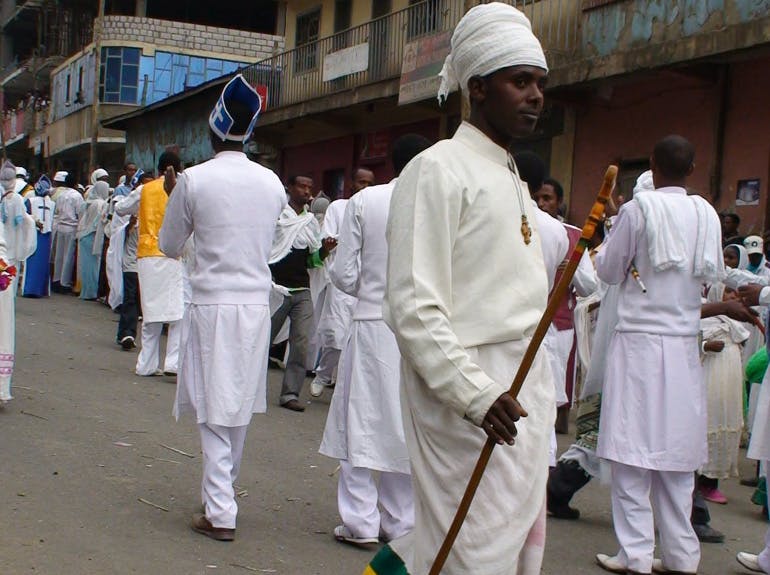
Ethiopian Christianity through the Looking Glass
The Robert P. Madison Family Distinguished Lecture in African and African American Art
- Lecture
- Ticket Required
Suzanne and Paul Westlake Performing Arts Center

Photo courtesy of Alexandra Sellassie Antohin
About The Event
Alexandra Sellassie Antohin (PhD, University College London) has conducted ethnographic research with Orthodox Christian communities in northeastern Ethiopia and the Russian Far East and historical research on the Russian Church in Alaska. These projects studied how liturgical participation at places of worship and pilgrimage events play a dynamic and sustained role in people’s devotional engagements, from the popular observances of feasting and fasting to the function of lay associations in mobilizing church affairs. Her past scholarly contributions explored the centrality of the covenant as a key principle for Ethiopian Orthodox Christians and how it manifests in dynamic ways in the stories, rituals, material culture, and social aspects of their lives.
The eastern African country now called Ethiopia has been home to a vibrant Christian culture since 330 CE, second only to Armenia, and even predating Rome. The arts of this region are featured in the CMA’s upcoming exhibition Africa & Byzantium, on view from April 14 to July 21, 2024. In her talk, Antohin will introduce key concepts that have shaped the expressive culture of Ethiopian Orthodox Christianity, including its artwork, and will showcase the ways these foundational ideas inspire a global fascination with the Horn of Africa as a place of profound spiritual importance.
“Ethiopia stretches her hands unto God,” the legend of Queen Sheba and King Solomon, the material presence of the Ark of the Covenant in Axum: for Ethiopian Orthodox Christians, these are prized and deeply ingrained forms of historical narratives, spiritual truth, and indigenous philosophical ethos. This presentation outlines key points of reference for how the covenant is understood in Ethiopia as well as by audiences attracted to and intrigued by its narrative of exceptionalism. How do tropes of Ethiopia as a land of a “biblically rooted way of life” contribute to the local and global consciousness that shapes Ethiopian articulations of itself as a place of spiritual significance? Reframing the covenant as expanding beyond Ethiopian religious and political exceptionalism offers a timely reappraisal of this concept in light of increased social fragmentation and the urgency for negotiating harmony in a country with many forms of diversity.
Sponsors
All education programs at the Cleveland Museum of Art are underwritten by the CMA Fund for Education. Principal support is provided by Dieter and Susan M. Kaesgen and Gail C. and Elliott L. Schlang. Major annual support is provided by Brenda and Marshall Brown, Mrs. Martine Kowal, Eva and Rudolf Linnebach, Medical Mutual of Ohio, the Edwin D. Northrup II Fund, Shurtape Technologies, and the Kelvin and Eleanor Smith Foundation. Generous annual support is provided by Gini and Randy Barbato, the M. E. and F. J. Callahan Foundation, Dr. William A. Chilcote Jr. and Dr. Barbara S. Kaplan, Char and Chuck Fowler, the Giant Eagle Foundation, Linda Harper, the late Marta and the late Donald M. Jack Jr., Susan LaPine, Bill and Joyce Litzler, the Logsdon Family Fund for Education, Sarah Nash, Courtney and Michael Novak, William J. and Katherine T. O’Neill, the Pickering Foundation, William Roj and Mary Lynn Durham, Suzanne Cushwa Rusnak and Jeff Rusnak, Ellen and Lowell Satre, in memory of Dee Schafer, Betty T. and David M. Schneider, the Sally and Larry Sears Fund for Education Endowment, Roy Smith, Paula and Eugene Stevens, the Trilling Family Foundation, Jack and Jeanette Walton, and the Womens Council of the Cleveland Museum of Art.
